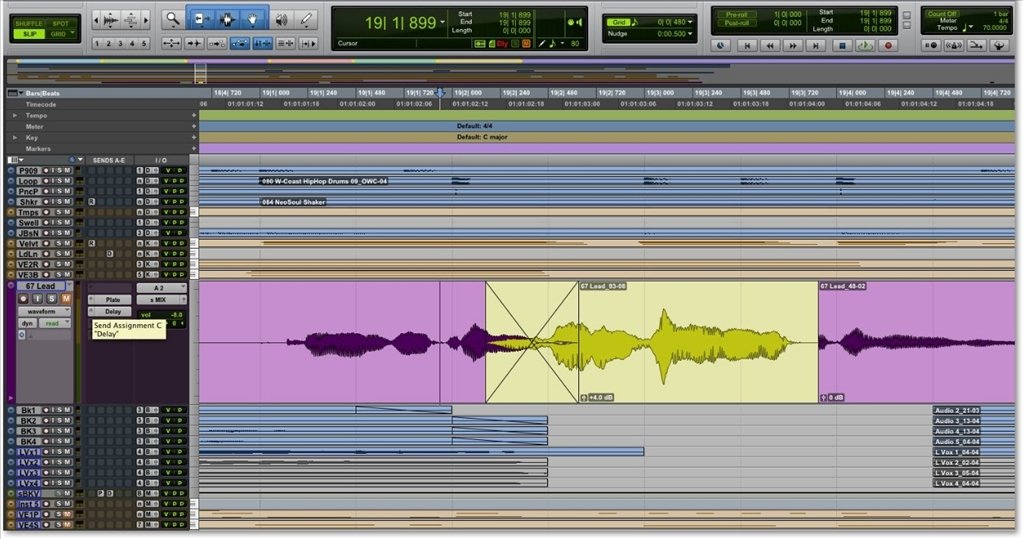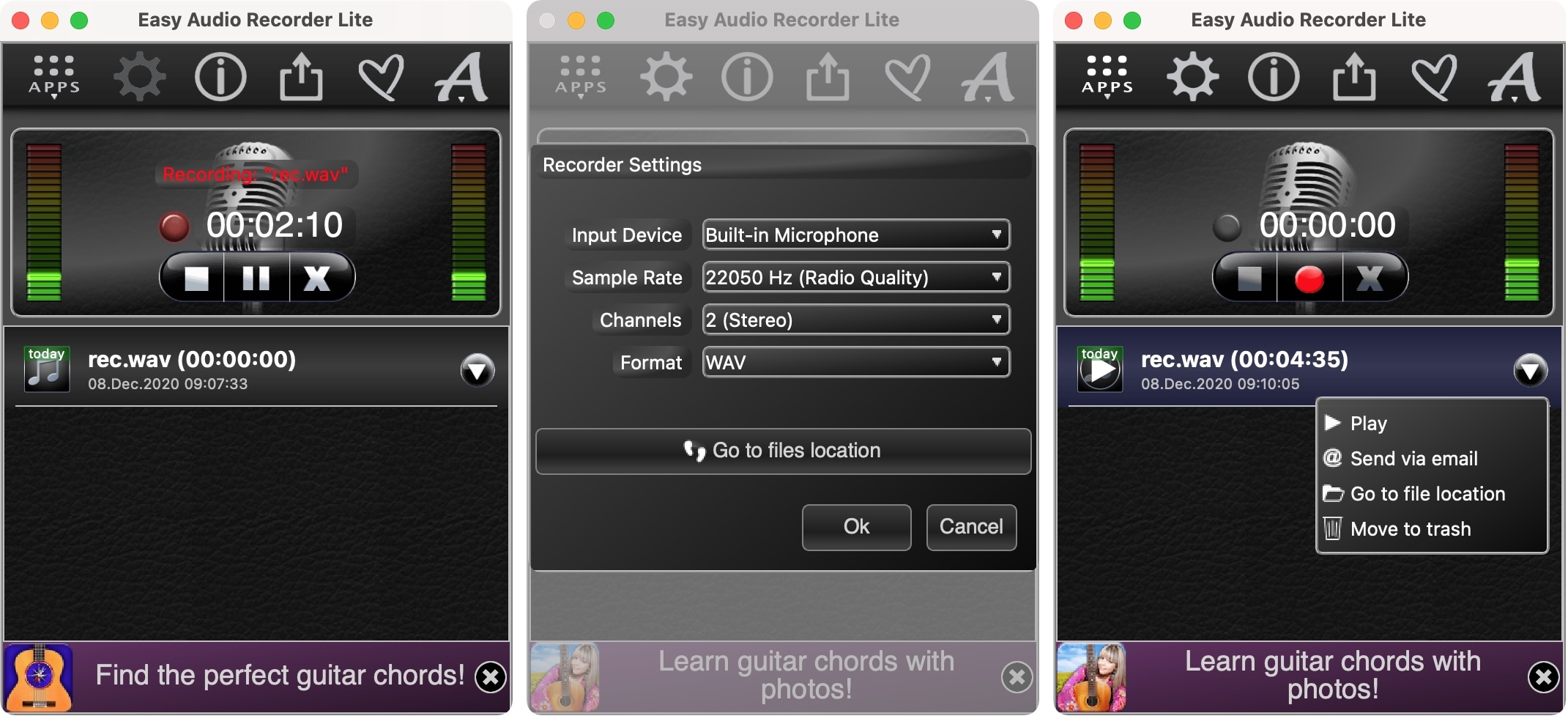In the car, on the treadmill, or at work, podcasts are airing in an ever-growing number of earbuds and headphones.
- Podcast Recording Software Pc
- Podcast Studio Software
- Podcast App For Mac
- Best Podcast Editing Software Mac
With podcasts in 2020 numbering 850,000 and constantly growing, having the best podcast editing software is essential to standing out and competing in this increasingly crowded podcast market. The best podcast software will make your podcast sound better and will give podcasters from beginner to veteran a professional sound that will have listeners coming back for more and advertisers lining up.
However, podcasting editing software can vary in price and function. How can we know what the best podcast editing software is?
GarageBand is a fully equipped music creation studio right inside your Mac — with a complete sound library that includes instruments, presets for guitar and voice, and an incredible selection of session drummers and percussionists. Free, open source, cross-platform audio software. Audacity is an easy-to-use, multi-track audio editor and recorder for Windows, Mac OS X, GNU/Linux and other operating systems. There are many local podcast recording softwares to choose from but our top three are Audacity, QuickTime, and Adobe Audition. It’s a free audio editor for PC and Mac and a great tool for beginners. There are numerous effects you can add to your final audio files and plenty of installable plugins. Here are the Best Podcast Apps for Windows, Mac and Mobile. By Michael Bryant. Though The Podcast App is free, you can unlock special features, including a wellness pack, for extra.
In this roundup, we have tested and collected 5 options for the best software for podcast editing that you can choose, whether you are already podcasting professional or planning to start a podcast.

Podcast Profitability: Why Buy Editing Software
The popularity of podcasts and podcasting is growing steadily, according to Statista, with 75 percent of Americans being familiar with the term. More than half of Americans listen to podcasts on subjects including news, sports, interviews, entertainment, and more.
Podcasts are growing in profitability. Podcaster Joe Rogan signed a $100 million deal in 2020 with Spotify that will make his podcast, 'The Joe Rogan Experience,' exclusive to Spotify. In 2019, the creators of the podcast 'My Favorite Murderer' signed a two-year deal with Stitcher worth at least $10 million.
Podcast advertising is growing, too, with a 45 percent increase in ad purchases predicted, up to $1.13 billion in the U.S. Use of smartphones is driving growth in podcast advertising since podcasts are only a tap away on devices that are nearly inseparable from us all.
And that's the very reason why the podcast editing software is worth the purchase: you want a crisp, clear listening experience for your fans (and that million-dollar endorsement deal you're after).
In the following, these 5 options in the software for the podcast editor create a virtual audio workstation. They vary in price, but each of these options offers the ability to record, cut, splice, and edit on multiple tracks, all parts of professional podcast editing.
#1. VideoProc Vlogger
Podcast Recording Software Pc
VideoProc Vlogger is a robust yet novice-friendly podcast editing software that provides its users all the necessary tools to create impressive podcasts while keeping everything well organized and never tangle beginners into knots.
With it, you can drag the mouse on the big audio waveform window to select the audio segments that you need to edit. It allows you to handle multichannel audio, move audio from one section to another, start or end a BGM naturally with the Fade in and Fade out effect, and more.
To make VideoProc Vlogger 100% friendly for beginners, its developers preset dozens of equalizer settings. With these presets, you can change the human voice, improve the sound quality, remove background noise, and more in one click. You can also customize the equalizer settings to shape the podcasts as you wish. By selecting the sound effects from the preset 12 options, it's a breeze to add some fun to your podcast.
Pros:
- Free of charge.
- Good sound quality. Export 48kHz audio.
- Convert the voice into man, woman, and robot, etc.
- Support all popular sorts of audio, including the iPhone recordings.
- Support 999+ audio tracks. Add music to podcasts easily.
Cons:
- No ready-stock music.
#2. Audacity
Compatible with Apple and PCs, Audacity is a free, open-sourced option for multi-track podcast editing software. Available since podcasting's early days of 2000, Audacity is the podcast editing software that many podcasters started out using. It's still a great option for podcasters ranging from beginners to professionals.
Podcasters can use Audacity to record their original audio. From there, Audacity can take care of various audio editing tasks such as the removal of background noise and pauses, adjusting levels, and adding music. Audio engineers can even add intros, outros, and advertisements, covering all the needs of a podcaster.
Audacity has remained free for the past 20 years to keep it popular and useful and to promote collaboration. Because of Audacity's open-sourcing, people from all over the world have contributed code, fixed any glitches, and, in general, have enhanced the user experience.
Audacity has enjoyed solid popularity over the years, reaching the milestone of 100 million downloads by fall 2020.
Pros:
- Audacity allows podcasters and audio engineers to record, cut, splice, and edit for free, putting the podcasting experience within reach of everyone.
- Audacity has longevity in the industry, so it's a reliable tool with constant improvements.
- Open-sourcing keeps the functions of Audacity fresh, thanks to contributions from users and fans from around the world.
Cons:
- For podcasters who like to know their tools in and out, the frequent updates with Audacity might not be ideal.
#3. Pro Tools by Avid
Pro Tools by Avid offers full production and sound recording software, forming a virtual audio workstation for podcasting and podcast engineering.
Pro Tools starts with a free version, Pro Tools First, on the Avid website. Upgrading to the full version of Pro Tools requires a monthly subscription of about $25 a month. The Pro Tools HD version is available for about $85 per month.
Podcast editors can try the free version of Pro Tools, take advantage of Avid's online tutorials, and put that knowledge to work if they decide to upgrade to one of the paid versions. Each upgrade builds on the skills built as you work your way up.
Pros:
- Pro Tools by Avid offers some of the most powerful podcast editing tools in the industry.
- Various subscription levels depending on your needs (and budget).
- Even the free option can edit from 16 simultaneous tracks.
Cons:
- Not every podcaster will appreciate having to use MIDI for production.
#4. Adobe Audition
When it comes to podcast editing, Adobe Audition is in a category of its own in terms of its capabilities, according to PC Magazine. You can add music, segue, create templates, and customize your audio editing platform using the software.
This audio workstation is part of the Adobe Creative Cloud plan that offers a suite of Adobe apps for about $50 a month. For one app, such as Adobe Audition, the cost is about $20 a month.
If you're not sure whether Adobe Audition is best for your audio editing needs, it does have a free trial version.

When you have an Adobe subscription, you're assured of having the latest versions of Audition and other software. The latest version of Audition is well-suited for beginning podcasters since it includes helpful tutorials for some of the most common podcast editing tasks such as removing background noise, mixing, and producing.
Walk yourself through some of the Adobe Audition tutorials, and you'll learn the basics of podcast editing. From there, you have plenty of room to grow in skills, and knowledge of podcast editing.
Pros:
- Adobe offers a wide array of functions in its Audition podcast editing software including multitrack mixing, audio spectrum analysis and a large array of digital effects.
- Tutorials help you master the ins and outs of your recording and retouching process.
Cons:
- Some say that Adobe neglects Audition in favor of releasing updates/fixes for other pieces in their software suite.
#5. Alitu

What if you don't know much about sound editing for podcasts and don't want to learn? Alitu was designed for you. This easy-to-use web-based podcast editing software will take raw audio and do all the leveling work for you. It will even publish your podcast once you're ready.
This podcast editing software lets you enjoy storytelling and conversations without having to deal with the sound editing details that the non-engineers of the world may not enjoy. You can even add a special teaser to your podcast using an Alitu template.
Much of the editing can be automated through Alitu, but as you build your skills, you may not want to automate everything. With Alitu, you can edit as much or as little as you'd like, adding music, sound fades and other special effects to make your podcast shine.
Pros:
Podcast Studio Software
- Alitu is fun and easy to use, even for those who don't know much about sound engineering or technology.
- Leveling sound, removing background noise, and even publishing your podcast can be automated, but it doesn't have to be.
Cons:
- Inability to tweak audio settings manually; you're at the mercy of pre-sets.
#6. Hindenburg
Hindenburg Systems' software is created for radio use, which is like a first cousin to podcasting. Spoken audio productions are their specialty. Because of this, Hindenburg has features geared toward podcast editing.
An auto-leveling function evens the sound between speakers or headphones automatically, making podcast editing easier. Hindenburg also features an automatic voice profiler that uses EQ and compression to automatically optimize the sound; you can edit your speech with a single click.
Hindenburg's Journalist Pro version, designed for podcasters and audio journalists, has a built-in Skype recorder and a one-click publish function. This will make recording interviews and making your podcast available to listeners easy, a plus if you are a podcaster and engineer all in one.
You can get a 30-day free trial to try out Hindenburg's features and see if they're right for you and your podcast editing. Hindenburg has plenty of tutorials to get you started.
Pros:
- Hindenburg's features are designed with audio storytelling and podcasting in mind.
- Features including auto-leveling, automatic sound optimization of voices, and one-click publishing will make your podcast editing easier.
Cons:
- There's a bit of a learning curve, especially if you start with other tools first.
Podcast App For Mac
That's a Wrap
Got a story to tell? You can tell it better by using the best podcast editing software. As a podcast editor, you can make your podcast more competitive by having quality sound and production. You can get this by using the best podcast editing software.
Best Podcast Editing Software Mac
Both free podcast editing software and paid ones in this list offer online audio editing options for podcasters and audio engineers at all skill levels, whether you're a beginning podcaster or an experienced professional.